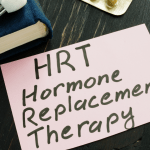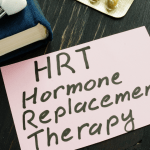The Intersection of Menopause and Sexual Health
Menopause marks a significant transition in a woman’s life, one that often coincides with profound changes in sexual health. The cessation of menstruation is accompanied by a decrease in the production of hormones such as estrogen and testosterone, which can lead to a variety of physical and emotional changes. These changes may include vaginal dryness, decreased libido, and changes in sexual response, all of which can affect a woman’s sexual experience and desire. Understanding the complex interplay between menopause and sexual health is crucial for addressing the sexual side effects that many women face during this time.
The Role of Sex Therapy in Addressing Sexual Issues
Sex therapy is a specialized form of counseling that focuses on helping individuals and couples address sexual issues, including those that arise during menopause. Sex therapists are trained to navigate the sensitive topics of intimacy and sexual health, providing a safe space for women to explore their feelings and concerns. Through sex therapy, women can learn to communicate their needs, explore new forms of intimacy, and find ways to enhance their sexual experiences. The goal is not only to address the physical symptoms of menopause but also to foster a deeper understanding and enjoyment of one’s sexual life.
Challenges and Misconceptions Surrounding Sex Therapy
Despite its benefits, sex therapy is often shrouded in misconceptions and stigma. Many individuals mistakenly believe that sexual issues are a normal and unchangeable part of aging, or they may feel embarrassed to seek help. Others may not be aware that therapies exist to address the sexual side effects of menopause. Overcoming these challenges involves increasing awareness and promoting open dialogue about the role of sex therapy. By dispelling myths and encouraging women to seek support, we can help them navigate menopausal changes and maintain fulfilling sexual relationships.
The Process of Sex Therapy
Initial Assessment and Communication
The journey of sex therapy often begins with an initial assessment, where the therapist gathers comprehensive information about the individual’s or couple’s sexual history, medical background, and the specific sexual challenges they are facing. This stage is crucial for establishing trust and open communication between the therapist and the client(s). It is a time for the therapist to listen actively, validate the client’s experiences, and set the stage for the therapeutic work ahead. The therapist may use questionnaires or interviews to understand the nature and extent of the sexual concerns, and to identify any underlying psychological, medical, or relational factors that may be contributing to the problem.
Behavioral Techniques and Homework
Following the assessment, therapists often introduce behavioral techniques and homework assignments designed to address specific issues. These may include exercises to enhance communication between partners, strategies to increase non-sexual physical intimacy, or activities aimed at reducing performance anxiety. Homework is a vital component of sex therapy, as it encourages clients to apply the skills learned in therapy to their everyday lives and relationships. It also helps to reinforce new patterns of behavior and thought that can lead to improved sexual experiences.
Sensate Focus Exercises and Their Stages
A central element of sex therapy is the use of sensate focus exercises. Developed by Masters and Johnson, these exercises involve a series of stages that encourage individuals or couples to explore touch and sensation without the pressure of achieving orgasm or maintaining an erection. The initial stages focus on non-genital touching and gradually progress to more intimate forms of physical connection. Sensate focus is designed to reduce anxiety related to sexual performance and to foster a deeper sense of intimacy and connection between partners.
Education and Addressing Misconceptions
Sex therapy also involves a significant educational component, where clients are provided with accurate information about sexual anatomy, the sexual response cycle, and the effects of aging, health conditions, and medications on sexual function. This knowledge can empower clients to make informed decisions about their sexual health and can dispel any misconceptions or myths that may be contributing to their sexual difficulties. By addressing these misconceptions, therapists can help clients develop a more positive and realistic understanding of sexuality, which is essential for overcoming sexual challenges.

THEN IT CONTAINS TOXIC CHEMICALS. WHY RISK IT GETTING SICK? GO CHEMICAL FREE.
Sexual Side Effects of Menopause
Physical and Emotional Changes
Menopause marks the end of a woman’s reproductive years, and this transition brings about significant physical and emotional changes that can affect sexual function. The decline in estrogen and other hormones can lead to symptoms such as hot flashes, night sweats, mood swings, and sleep disturbances. These changes can disrupt daily life and contribute to a decreased interest in sex. Additionally, menopause can cause physical changes such as vaginal dryness, thinning of the vaginal walls, and decreased elasticity, which can lead to discomfort or pain during intercourse, further impacting sexual desire and satisfaction.
Impact on Libido and Intimacy
The hormonal fluctuations of menopause can directly impact a woman’s libido. Estrogen plays a crucial role in sexual arousal by maintaining vaginal health and blood flow. As estrogen levels drop, women may experience a decrease in blood supply to the vagina, leading to reduced lubrication and a decline in sexual desire. This can strain intimate relationships, as partners may struggle to understand and adapt to these changes. Open communication and mutual understanding are essential in navigating this shift in intimacy. Additionally, exploring new forms of emotional and physical connection can help maintain closeness during this transition.
Navigating Orgasm Difficulties
Orgasm difficulties are another side effect that some women may encounter during menopause. These challenges can stem from both physical changes, such as decreased sensitivity due to hormonal shifts, and psychological factors, including stress or changes in self-perception. To address these issues, women are encouraged to explore their own bodies and discover what stimulates pleasure, which may include the use of vibrators or other aids. Sensate focus exercises, which involve non-genital touching and communication, can also help couples reconnect sexually without the pressure of achieving orgasm. If difficulties persist, consulting a sex therapist can provide tailored strategies to overcome these challenges and enhance sexual experiences.
It is important to note that while menopause can present challenges to a woman’s sexual health, it also offers an opportunity to rediscover sexuality in new and fulfilling ways. With the right support, education, and open dialogue, women can continue to enjoy a satisfying sex life during menopause and beyond.

From unhappy, dry, and sandpaper to silky, smooth and feeling good. That’s Cleo. Cleo is a 100% natural labial balm to moisture and soothe “your other lips”. Cleo is chemical-free, water-free, pH optimized and helps maintain and restore your delicate labial skin’s natural flora. Ideal for daily use or as needed. Get the most silky, lovable lips ever.
Counseling vs. Sex Therapy
When to Choose Counseling Over Sex Therapy
Deciding between counseling and sex therapy can be challenging, as both aim to resolve personal and relational issues. However, counseling is often the preferred choice when sexual problems are deeply intertwined with broader psychological and relationship issues. If the sexual concerns are symptoms of underlying emotional conflicts, communication breakdowns, or non-sexual relationship problems, traditional counseling may be more beneficial. It provides a space to explore and address these foundational issues without the immediate focus on sexual outcomes. Counseling can also be a stepping stone for couples who find the direct approach of sex therapy too daunting initially.
Integrating Sex Therapy with Couples Counseling
Sex therapy and couples counseling are not mutually exclusive and can be integrated for a comprehensive approach. Couples may start with counseling to address general relationship dynamics and then incorporate sex therapy to focus on specific sexual issues. This integration allows for a tailored approach that respects the couple’s comfort level and readiness to tackle sexual matters. A therapist skilled in both areas can seamlessly transition between the broader aspects of the relationship and the intimate details of the couple’s sexual life, ensuring a holistic treatment plan.
Finding the Right Therapist
Finding a therapist who is a good fit is crucial for the success of therapy. When seeking a professional, consider their expertise in either sex therapy or counseling, depending on your needs. It’s important to inquire about their treatment philosophy, techniques used, and experience with menopausal sexual issues. Referrals from healthcare providers, trusted friends, or reputable professional organizations can guide you to qualified therapists. Remember, an initial consultation does not commit you to a long-term engagement. If the therapist’s approach does not resonate with you, it’s perfectly acceptable to seek another professional who better aligns with your preferences and goals.
Ultimately, whether you choose counseling or sex therapy, the aim is to enhance communication, deepen intimacy, and improve the quality of your sexual life. Both paths can lead to meaningful change, and the right choice depends on the unique circumstances and needs of the individuals involved.
Do you know the three main ways that your body gets in touch with harmful chemicals with everyday products? Knowledge is Power!
The Ultimate Detox Guide will tell you how to lower your exposure to harmful chemicals!

Effectiveness and Limitations of Sex Therapy
Clinical Evidence Supporting Sex Therapy
Sex therapy has been recognized as a valuable treatment approach for addressing sexual issues, particularly those intertwined with psychological and relational factors. Clinical evidence suggests that sex therapy can be particularly effective for conditions such as orgasm problems, sexual aversion, and vaginismus. The therapeutic process often begins with extensive communication and sharing, allowing the therapist to assess the problem and identify contributing factors. Techniques such as sensate focus exercises are designed to increase comfort with physical intimacy and enhance the couple’s sexual experience without the pressure of intercourse or orgasm. The effectiveness of sex therapy is further supported by the fact that even placebo therapy can lead to improvements in sexual function, indicating that increased attention to sexuality can have positive effects.
Limitations and Critiques of Sex Therapy
Despite its successes, sex therapy is not without limitations. It may not be as effective for treating low sexual desire when it is not primarily due to relationship issues or other psychological factors. Additionally, sex therapy requires active participation from both partners, which may not always be feasible. Critiques of sex therapy often focus on its inability to address underlying medical conditions that may contribute to sexual dysfunction. Moreover, the approach may be too intensive for some couples, and finding a qualified sex therapist can be challenging.
The Placebo Effect and Its Implications
The placebo effect in the context of sex therapy highlights the complex interplay between mind and body in sexual function. Clinical studies have shown that women participating in placebo therapy during trials for medications targeting female sexual problems saw improvements in their sexual function. This suggests that the mere act of focusing on sexuality, such as enrolling in a study or seeking counseling, can lead to positive outcomes. The implications of the placebo effect in sex therapy underscore the importance of psychological and educational interventions as part of a comprehensive treatment plan for sexual dysfunction.
Solo Sex Therapy
When to Consider Individual Therapy
Individual therapy for sexual health may be particularly beneficial when a person identifies personal sexual concerns that they wish to explore privately. This can include issues such as low sexual desire, arousal difficulties, or orgasmic challenges that one may not feel comfortable discussing in the presence of a partner. Additionally, individual therapy may be appropriate when a person’s partner is unwilling or unable to participate in couples therapy, or when the individual has specific psychological or relationship issues that underlie their sexual problems. It is also a viable option for those who have experienced sexual trauma or who have deeply ingrained negative attitudes about sex or masturbation.
Involving an Unwilling Partner
When a partner is unwilling to participate in sex therapy, it can be challenging for the individual seeking help. However, it is important to communicate the benefits of therapy to the partner and encourage them to attend at least one session. This can help the therapist understand the partner’s perspective and may increase the likelihood of the partner’s future involvement. If the partner remains unwilling, individual therapy can still be beneficial. The therapist can work with the individual to explore relationship dynamics, enhance communication skills, and develop strategies for increasing physical affection without the pressure of intercourse.
Benefits of Solo Therapy in a Relationship Context
Solo sex therapy can empower individuals to take charge of their sexual health and well-being. It offers a safe space to discuss sensitive issues, learn about the physical causes of sexual problems, and address misconceptions about sex. Solo therapy can lead to personal growth and self-discovery, which can indirectly benefit the relationship. By becoming more aware of their own sexual needs and desires, individuals can better communicate with their partners and find new ways to experience intimacy. Additionally, solo therapy can help individuals manage stress and anxiety, which are often barriers to sexual arousal and desire. Ultimately, the skills and knowledge gained from solo therapy can contribute to a more fulfilling sexual relationship, even if the partner is not directly involved in the therapy process.
By the way, something for you, a little gift!!!
I am just in the middle of publishing my book. It’s about How women can balance their hormones. One part is about food and diet, of course.
Follow this link and enter your email.
I will send you this part of the book for free once the book is published. It has many concrete, practical tips and recipes and will help you feel better during menopause or times of Big hormonal fluctuations.
Annette, Damiva Lead for Health & Wellness

Conclusion and Further Considerations
Summarizing the Role of Sex Therapy in Menopause
Throughout this article, we have explored the multifaceted role of sex therapy in addressing the sexual side effects of menopause. Sex therapy offers a comprehensive approach that encompasses education, communication enhancement, and behavioral techniques to help women navigate the physical and emotional changes associated with menopause. By focusing on the individual’s experience and the couple’s dynamic, sex therapy can facilitate a deeper understanding of sexual health and foster intimacy during this transitional period.
Encouraging a Holistic Approach to Sexual Health
Menopause is not solely a biological event but an intricate life stage that impacts a woman’s sexual health on multiple levels. A holistic approach to sexual health during menopause should consider the psychological, relational, and sociocultural factors that influence a woman’s sexual well-being. Healthcare providers are encouraged to adopt a multidisciplinary perspective, integrating medical interventions with psychosexual counseling to address the full spectrum of needs that may arise during menopause.
Resources and Support for Ongoing Education
Education is a cornerstone of effective sex therapy and counseling. Women and their partners benefit from access to accurate information about menopause and its impact on sexual function. Resources such as support groups, educational workshops, and evidence-based literature can empower women to make informed decisions about their sexual health. Additionally, ongoing professional development for therapists and counselors is crucial to ensure that they remain informed about the latest research and therapeutic techniques in this evolving field.
In conclusion, sex therapy and counseling play a pivotal role in addressing the sexual side effects of menopause. By adopting a holistic and educational approach, healthcare professionals can support women in maintaining a fulfilling sexual life during menopause and beyond. As we continue to advance our understanding of menopause and sexual health, it is imperative to advocate for resources and support that enable both individuals and couples to navigate this complex life stage with confidence and positivity.









